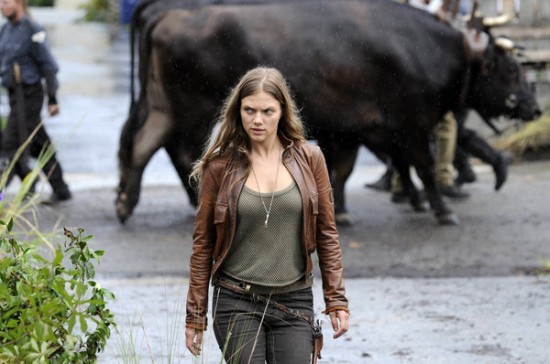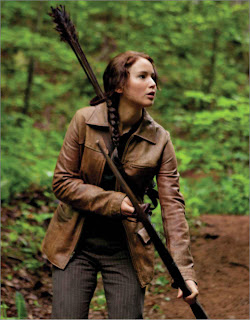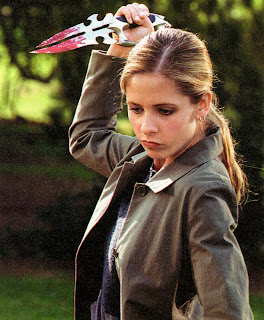I’m not entirely certain that this idea has crystalized yet
for me, but I trust all of you enough to hear it as is. You hear that,
internet? I trust you.
We can talk about my bad life choices later.
Anyway, in my spare time, because I am a massive nerd, I
listen to lectures from iTunes U, and most recently I’ve been working through
the fabulous Literature for Young Adults series from La Trobe University. It’s
really good. What struck me, though, was an off hand remark from the professor,
where he noted that in stories like The
Lioness Quartet or the Bitten series,
the female protagonist goes head to head with male patriarchy, but she does so
in a way that seems to actually reinforce the patriarchy.
Essentially, Alanna gets to be a knight in The Lioness Quartet not because she is a
qualified girl, and therefore just as fit for the job as a boy, but because she
is exceptional. She is the only person who could ever do the things she’s done,
and for that she deserves to be a knight. But if she were just some regular
girl who could fight, no dice.
And this is very interesting. I don’t think it’s the full
story, but it’s a good start. I wholeheartedly agree that stories like The Lioness Quartet and Garth Nix’ Abhorsen series do create an idea that
the only person who can break down barriers is an exceptional one, someone so
special and amazing that they can’t help but break down barriers, and this
strikes us as immediately unfair. But, I think, it’s actually pretty true.
Looking back on our own history, it isn’t normal people who
get to break barriers. We don’t look back in history and go, “Oh, yeah, I guess
that guy was the first African-American major league baseball player. He was
just okay. Played a few years then retired.” No, we talk about Jackie Robinson,
who virtually reinvented the game and was so exceptional that we have never
stopped talking about him.
The people who break down barriers are the exceptional ones.
It’s just true, not really something we can debate. And a lot of that really
appeals to us. We all long to be the special, needed one. If we didn’t, books
like Harry Potter and Twilight wouldn’t sell nearly as well as
they do. We all want to be in some way exceptional.
Most YA books tap into this pretty well, especially ones
written for girls. Nearly all of the Anne McCaffrey books feed into it, as do
the Kelley Armstrong books, the Madeleine L’Engle series, and Hunger Games. We all want to be special.
The part that the professor neglected to mention, though,
the part that actually hits me as more important, in a way, is that someone has
to follow. Yes, we have the truly amazing and exceptional people who break down
the walls, but we also need the rather ordinary folks who follow after. Society
isn’t just a continuous onslaught of gamechangers. It’s a breakthrough, and
then a slow creep towards normalcy. And, tragically, it’s this slow creep that
is most often neglected.
I give Tamora Pierce a lot of credit here, actually. While
her Lioness Quartet is arguably the
worst offender in the “only special people need apply” category, she follows it
up with another series about the first female knight after Alanna, and I appreciate that. She even goes so far as to
talk about the challenges faced by Alanna’s daughter, who doesn’t want to be a
knight like her mom. That is good follow-through.
Social systems don’t change in a day. While it is true that
many of the unfair laws and societies that we see in our world and in the
stories we read could and should be defeated by ordinary people, it often takes
someone extraordinary to break down the wall. What is important is not to let
the wall build back up again.
The real story I think of when this comes to mind is the Harper Hall Trilogy by Anne McCaffrey. It’s part of her Dragonriders of Pern series, but focuses on the Harpers, a guild of
musicians/teachers, who guide the entire educational system on Pern, as well as
providing most of the entertainment.
The books follow Menolly, an extremely talented musician and
composer, who is forced to abandon music after her mentor’s death. Girls don’t
become harpers, and there’s no need for Menolly to keep playing silly songs
when she’s going to become a fisherman’s wife like everyone else in their hold.
Naturally, Menolly rebels, and runs away. Through the course
of the books we follow her journey through Pern, as she slowly comes to the
attention of the Harper Hall and is able to enroll there. Her family was right,
there are no other female harpers. She has to do it all from scratch, because
there are no other women to set as her example.
But. The difference here is that there used to be female
harpers. And why wouldn’t there be? It’s music and education, a perfectly
egalitarian skillset. Menolly might win approval and succeed because she is
exceptional, but she is more than just an exception to the rule because the rule itself is wrong.
That’s what makes an exceptional hero really work. When the
rule they’re fighting to overcome is inherently wrong, then it doesn’t matter
how ordinary or special they are. The rule will go eventually, regardless.
I do think that we all long for a unique identity, and I
entirely believe that it’s part of our makeup to desire exceptionality. But I
also think that there’s a place for wanting to be the person who comes next.
The person who picks up the banner and carries through. The person who makes the
sacrifices of the first worth it.
I want to be the second
female knight of Tortall. I want to show that it wasn’t just a fluke.
 |
| It's not just books that do this, for the record. |




I actually have my own half-baked thoughts on the matter myself. I kinda have a few different thoughts here, and I'm just going to throw them at you, if that's ok?
ReplyDeleteI've actually been thinking similar stuff recently. I read The Protector of the Small a couple of months ago, and then reread The Song of the Lioness, and I actually enjoyed Protector a lot more. Alanna had a great adventure, but with Kel I really got this feeling that she'd actually effected a permanent change in the society.
And then recently, I was reading how apparently Jos Whedon, champion of feminism, had wanted a second villain in The Avengers. Apparently he couldn't see how an effete character actor like Tom Hiddleston could be an effective threat against Earth's Mightiest Heroes. Like, he felt he needed some big physical hero to properly challenge them, as opposed to sneaky Loki, who is sometimes a girl (and ok with that)*. Thankfully he got overruled by the studio, but it just goes to show that even people who support feminism can get stuck in this whole idea that power comes from masculine virtues such as physical strength.
And just reading your opening paragraph, I also thought that while it's common enough to see stories about women going and doing the man thing and succeeding at it, you rarely see stories about the reverse. Men also have to face social opposition if they want to, say, be childcare workers, but nobody writes their stories. The only one I can really think of off the top of my head is Rory Pond, who is awesome. Why can't they make more of him? Cause ultimately, the lack of these male characters to complement the female characters who have to go against the patriarchy also serves to reinforce the patriarchy, because it is devaluing the kinds of work that women have traditionally engaged in.
And yeah. Those are my thoughts, and now I might go and listen to those lectures you were talking about, because I'm a massive nerd too.
*Well, not in the movies, but in the comics and in the mythology, and really, he's not the most manly-man.
I actually found it quite interesting that when a friend of mine asked for recommendations of stories where a male character was intentionally taking on feminine aspects in a way that wasn't just for laughs (like in most cross-dressing movies). And I had to admit I didn't have a lot of recommendations for her. Which probably just goes to show that the double standard of femininity still stands strong. Blech.
DeleteI love this post. This is a great topic to discuss. Recently, I have been reading an insane among of YA fiction, mostly dystopian novels with female leading characters. Questions about femininity and gender continue to come up as I read along. Great post! Thanks for sharing.
ReplyDelete